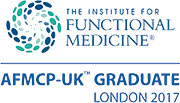DNA Testing

In my practice I use DNA testing (nutrigenomic tests) in certain cases.
Based on a client’s unique DNA, I can make better diet and lifestyle choices by looking at a number of genes that are involved in key biological processes that are all key factors in the onset of chronic disease. For example, cholesterol metabolism, detoxification, inflammation, food responsiveness, oxidative stress etc.
Genes can be turned on and off in cells. You can see the genes as the gun and the environment as the trigger, meaning that you can influence genes with what you eat, what your environment is like, how much exercise you get etc. Having a certain gene that is mutated doesn’t always mean it will cause disease, it just shows susceptibility to disease and change how you react to environmental exposures.
To give you an example: the VDRTaq1 C>T gene can give an indication if a client could be prone to having a higher bone turnover and increased bone loss. This is especially important for women going into menopause as there is a much higher risk of osteoporosis. So having a mutated VDRTaq1 C>T gene doesn’t mean that you will definitely get osteoporosis.
More information on how genes work can be found at https://ghr.nlm.nih.gov/primer/howgeneswork/geneonoff
Genes are involved in regulation of energy expenditure, appetite, and fat metabolism, so they can say something about how you regulate your weight. You probably have heard the saying ‘you are what you eat’, but body weight is also for a big part due to genetic factors. By looking at certain genes involved, a client’s susceptibility to obesity can be exposed and how the client responds to diet and exercise.
Apart from overall health and diet, it is also possible to focus on oestrogen. This is particularly of interest to women who suffer from oestrogen-dominant conditions such as PMS, endometriosis, uterine fibroids, or where there is a family history of breast, uterine or ovarian cancer.
Variations in genes involved in several oestrogen-related biological processes help identify which women have a higher lifetime exposure to oestrogens, oestrogen metabolites (a substance formed in or necessary for metabolism) and other carcinogens (substances capable of causing cancer in living tissue). This will help to establish the right diet and lifestyle.
For the sporty people among you, a DNA Sport profile test is available that tests for genes related to sporting performance. It looks at power and endurance, structural integrity of soft tissues in the body (i.e. are you predisposed to tendon injuries) and recovery genes (i.e. predisposition to inflammation and free radical stress in the body).
Choosing the right sport for your genetic type, the right training, lifestyle, nutrition and environmental interactions are the ingredients for athletic success.
Would you like to know more about DNA testing, give me a call at 07974429043 or email me at monique.parker@nutritionforyou.co.uk
More information on the DNA tests I use can be found at http://www.nordiclabs.com/EProduct.aspx?id=123






